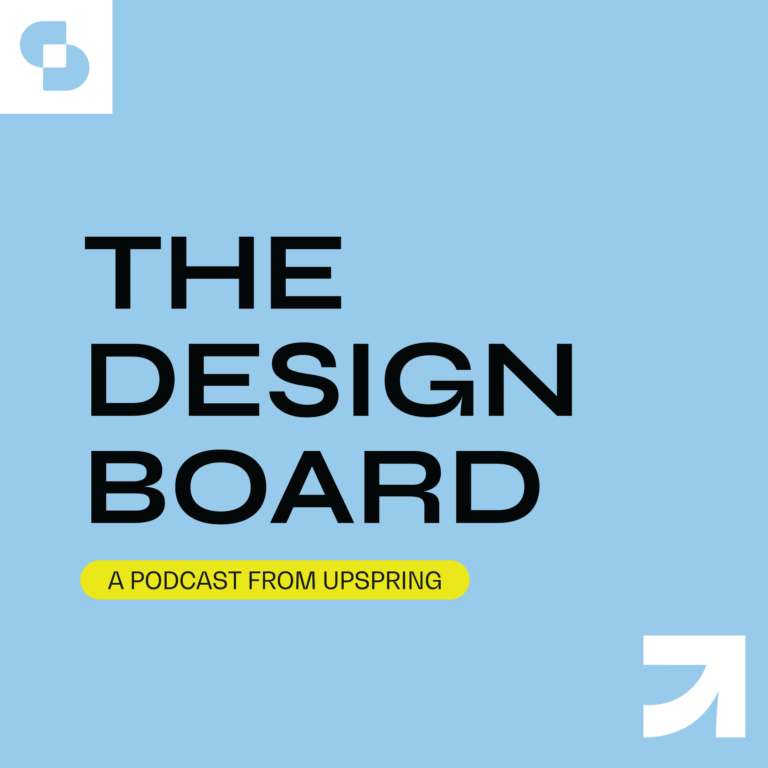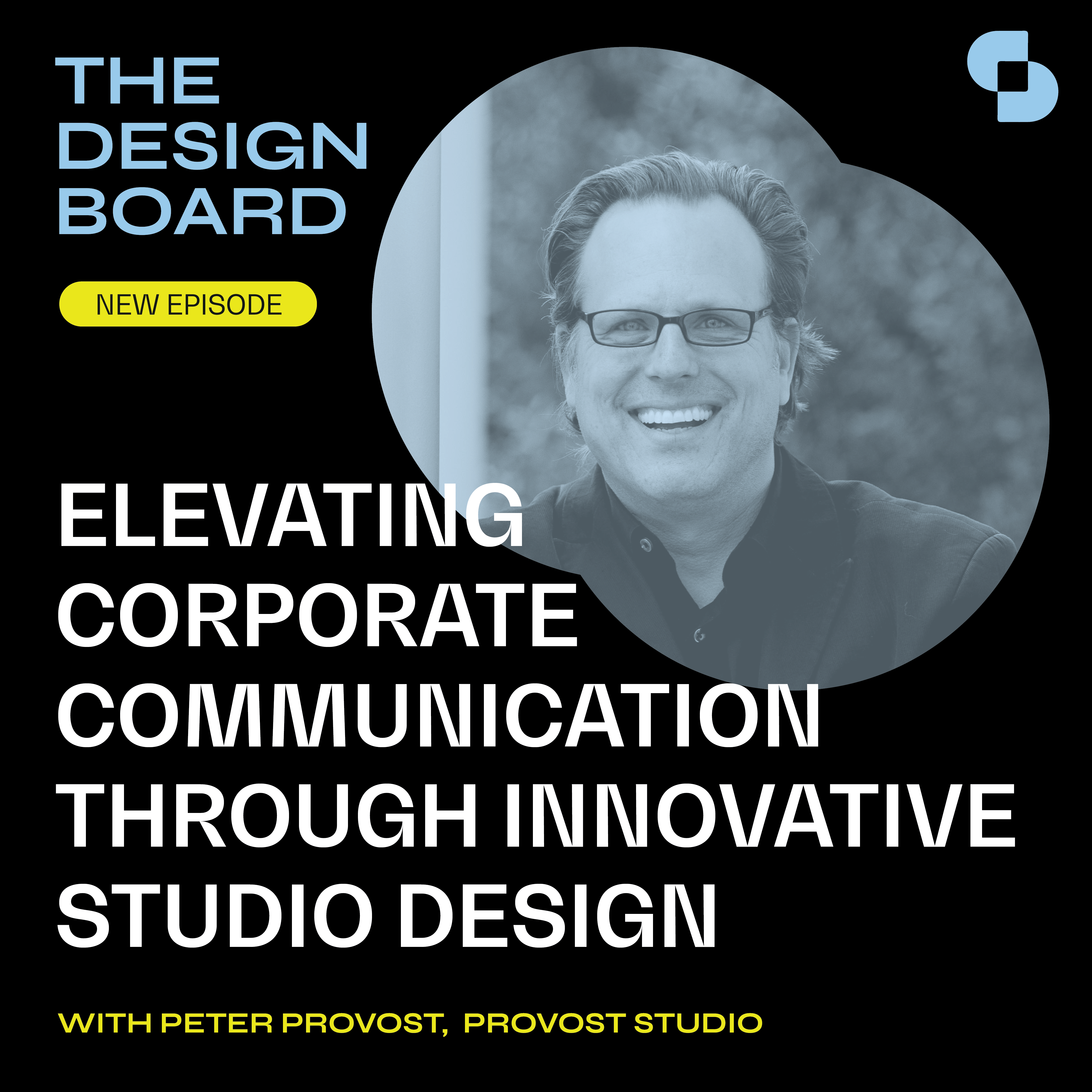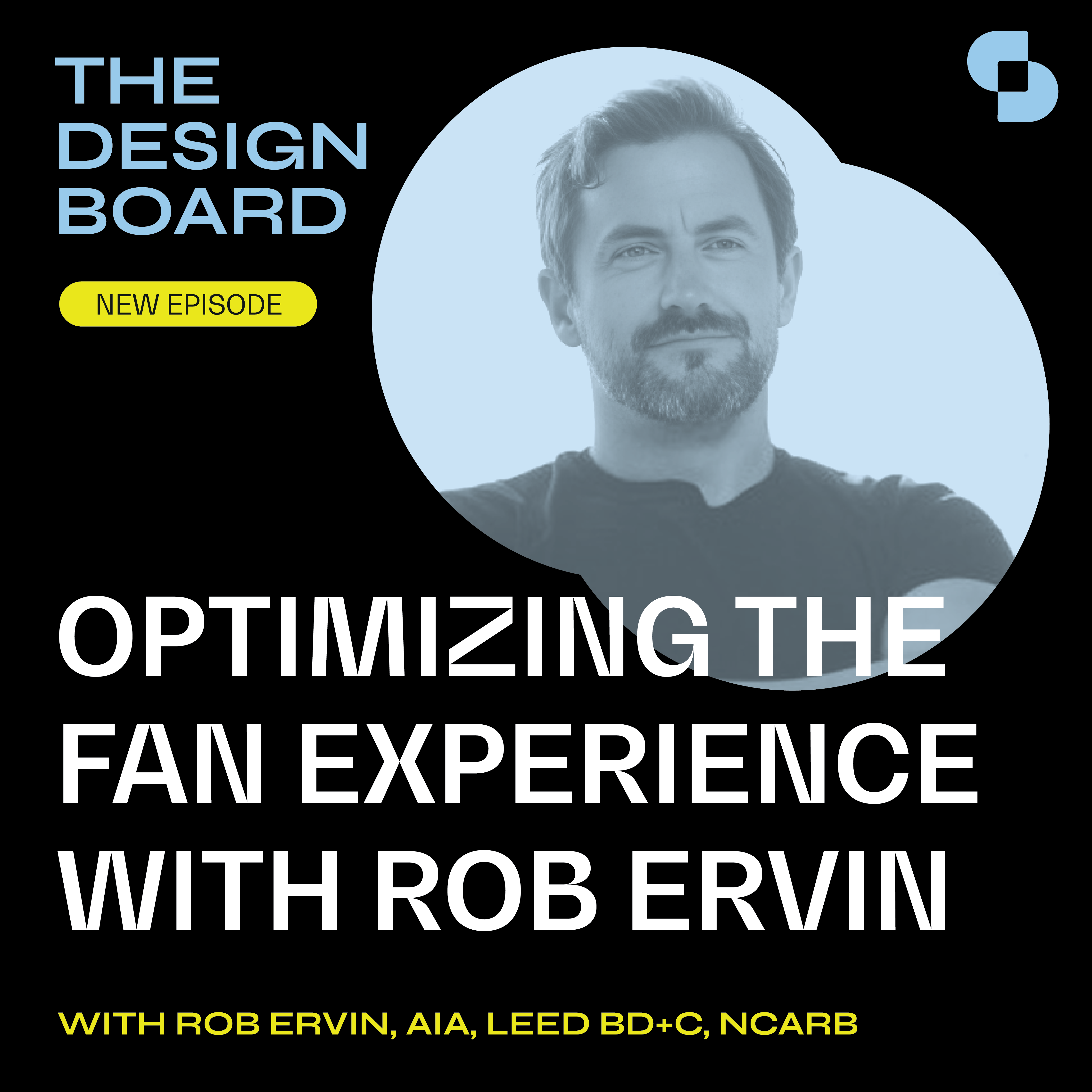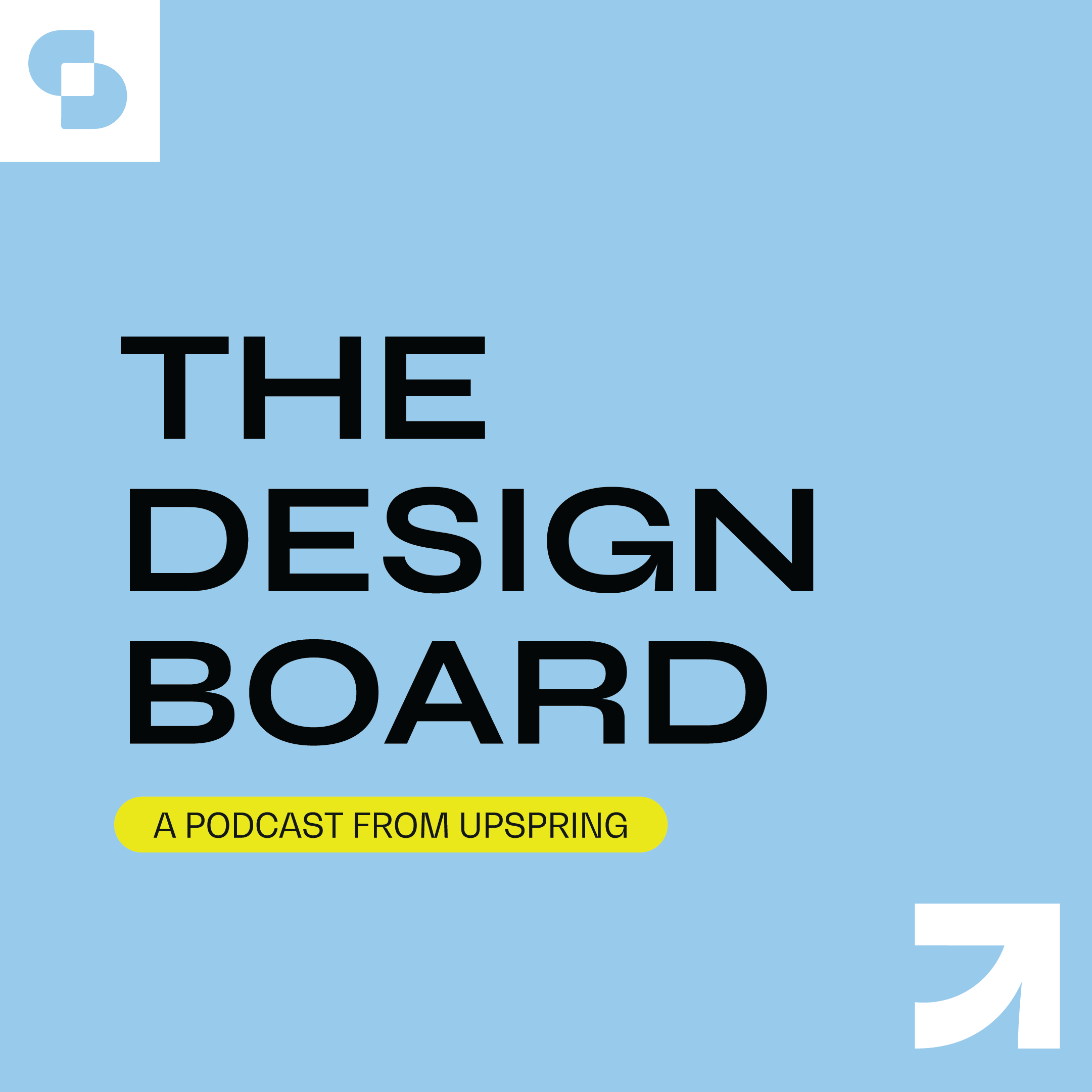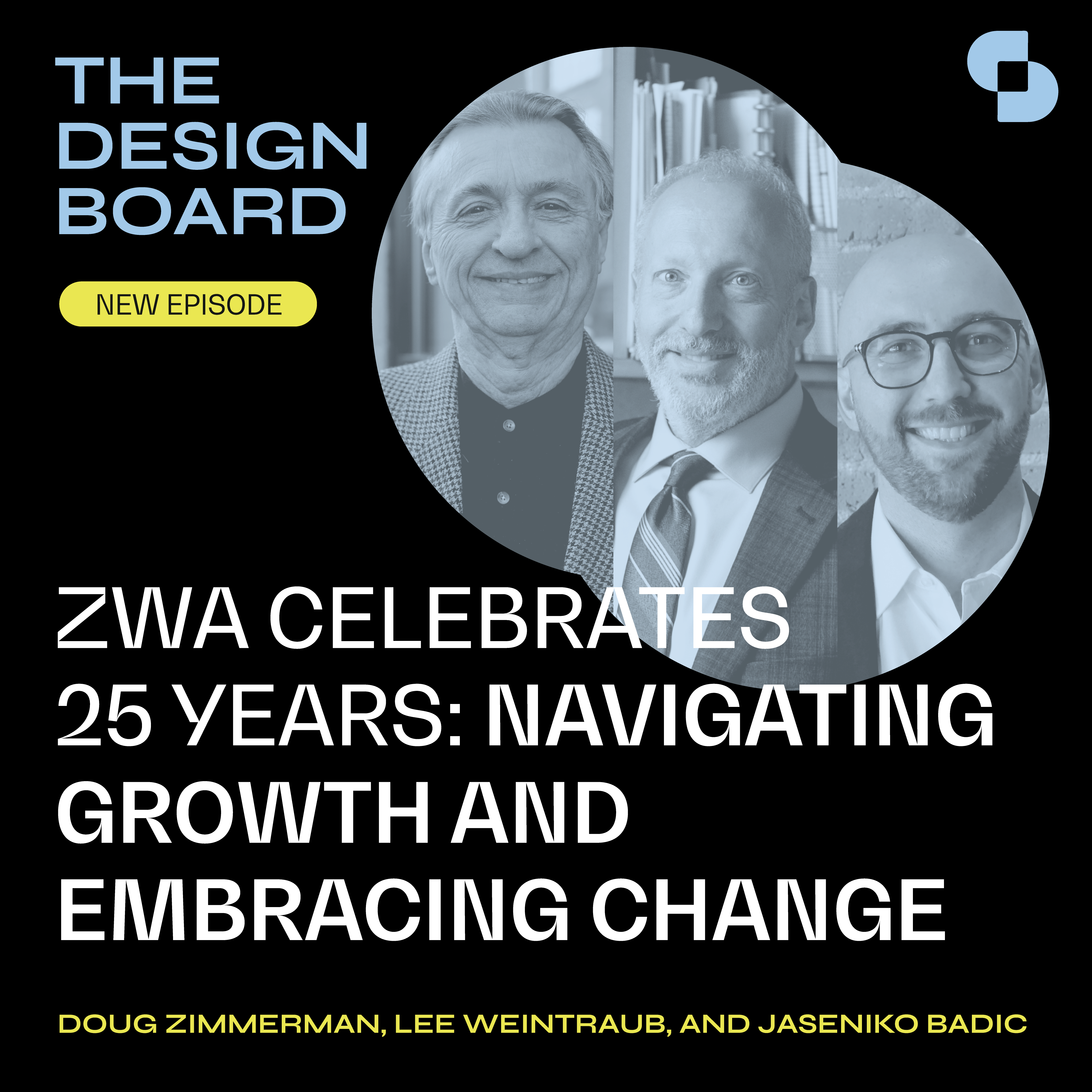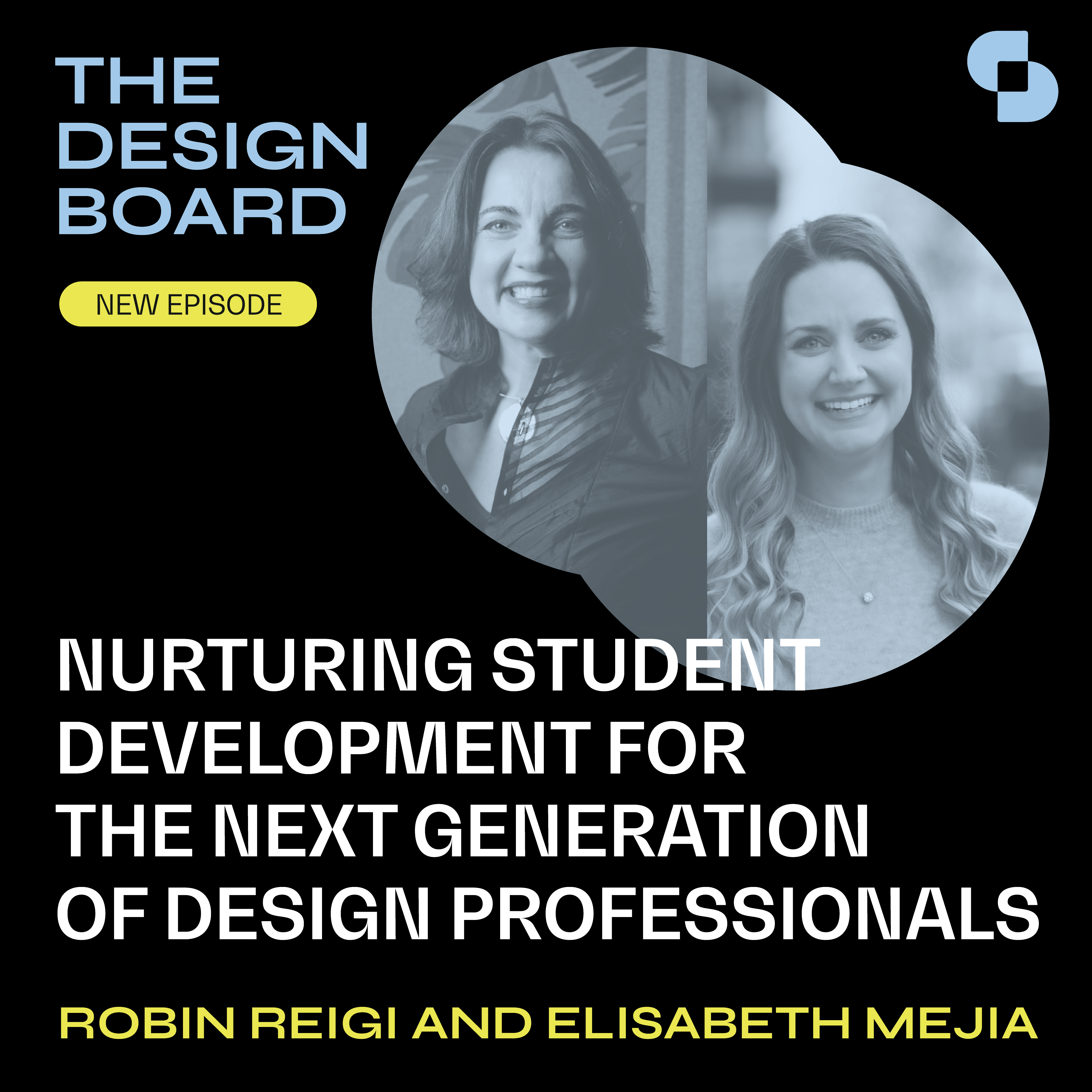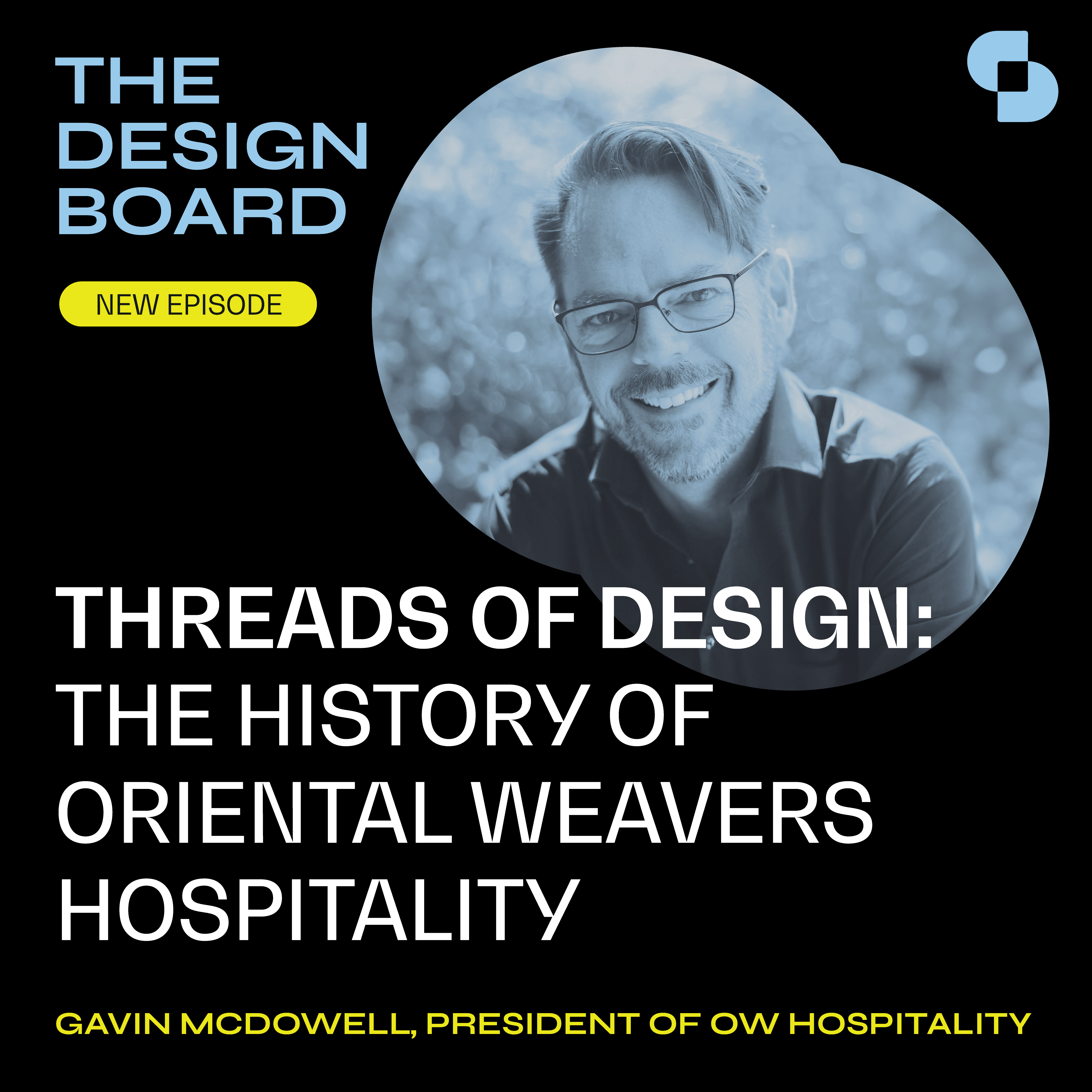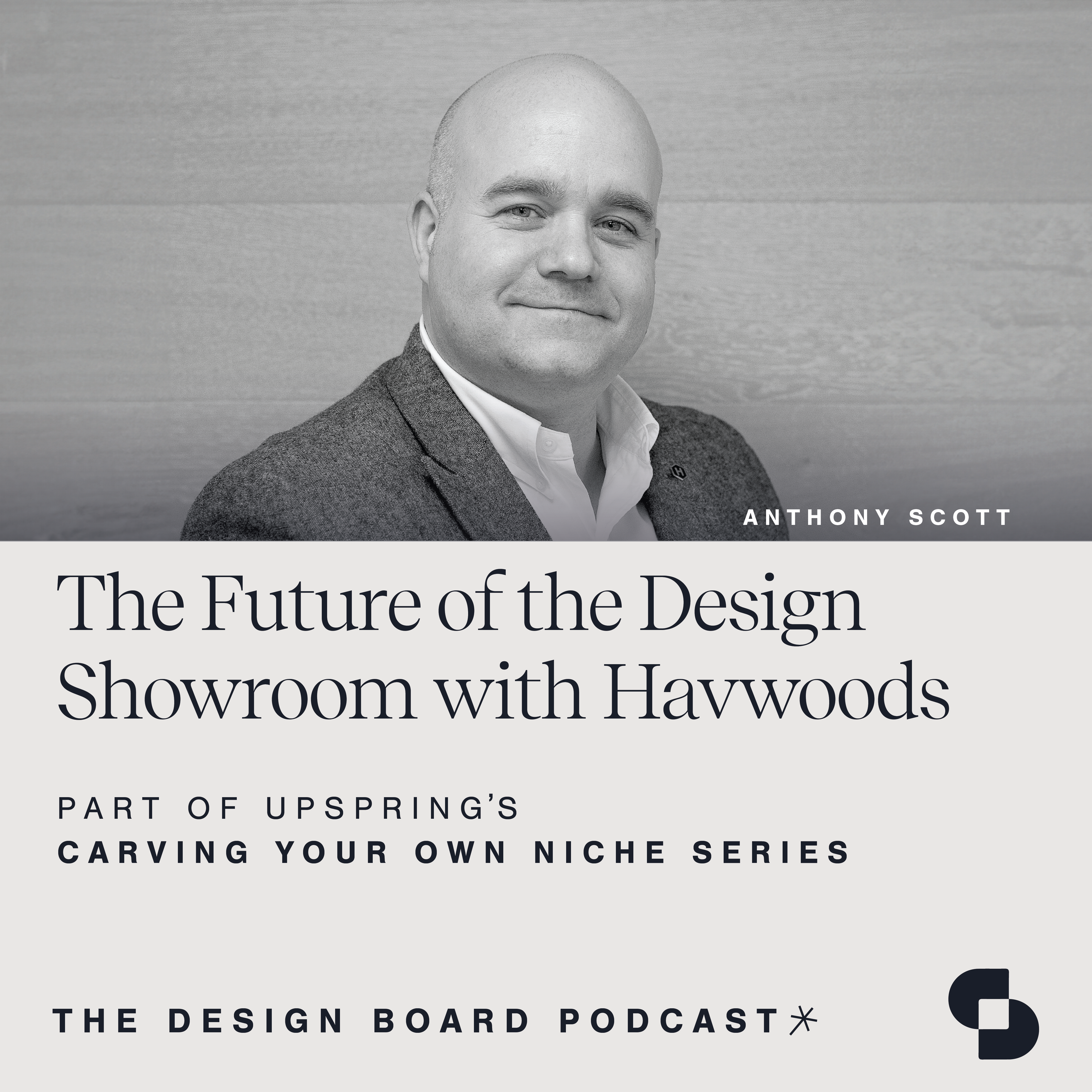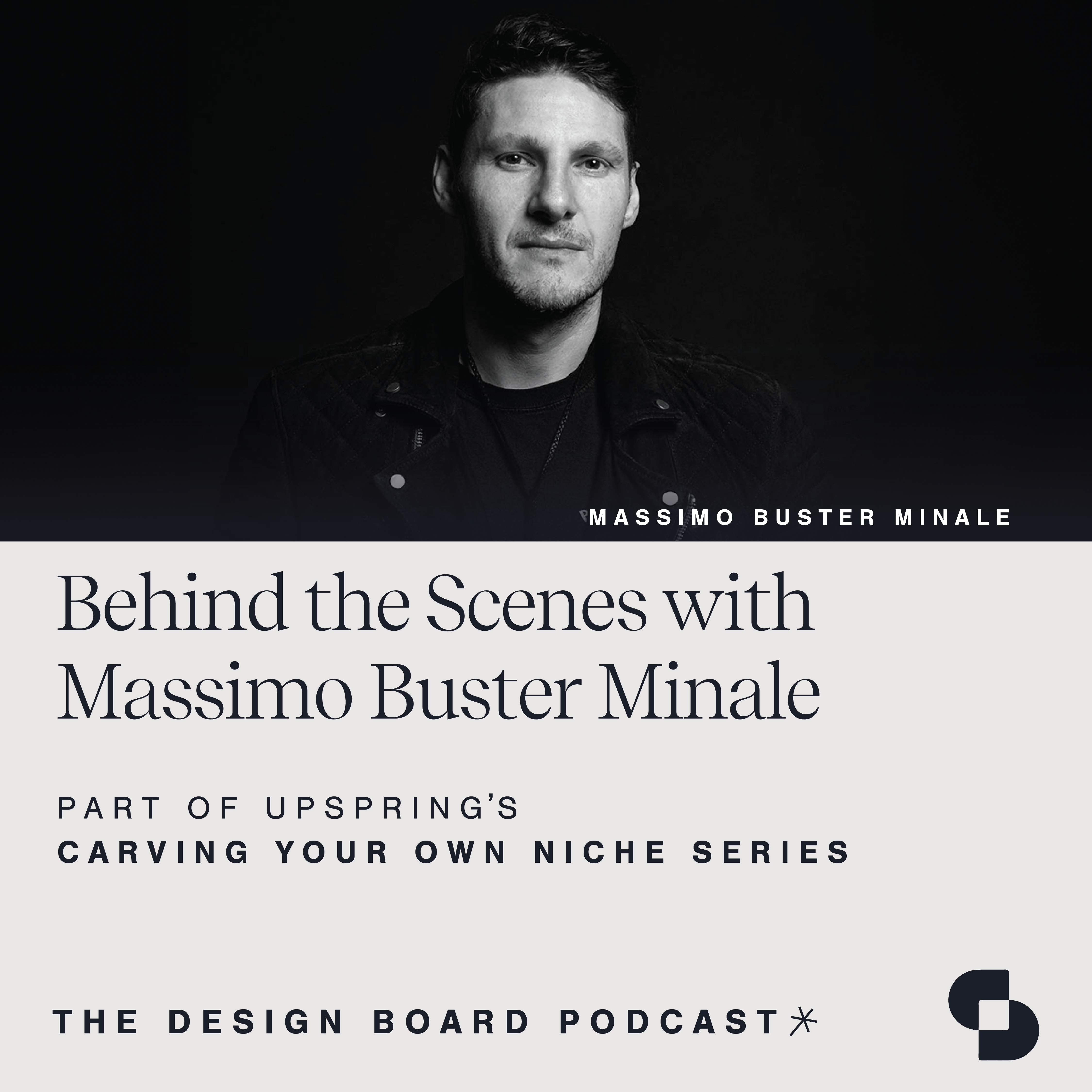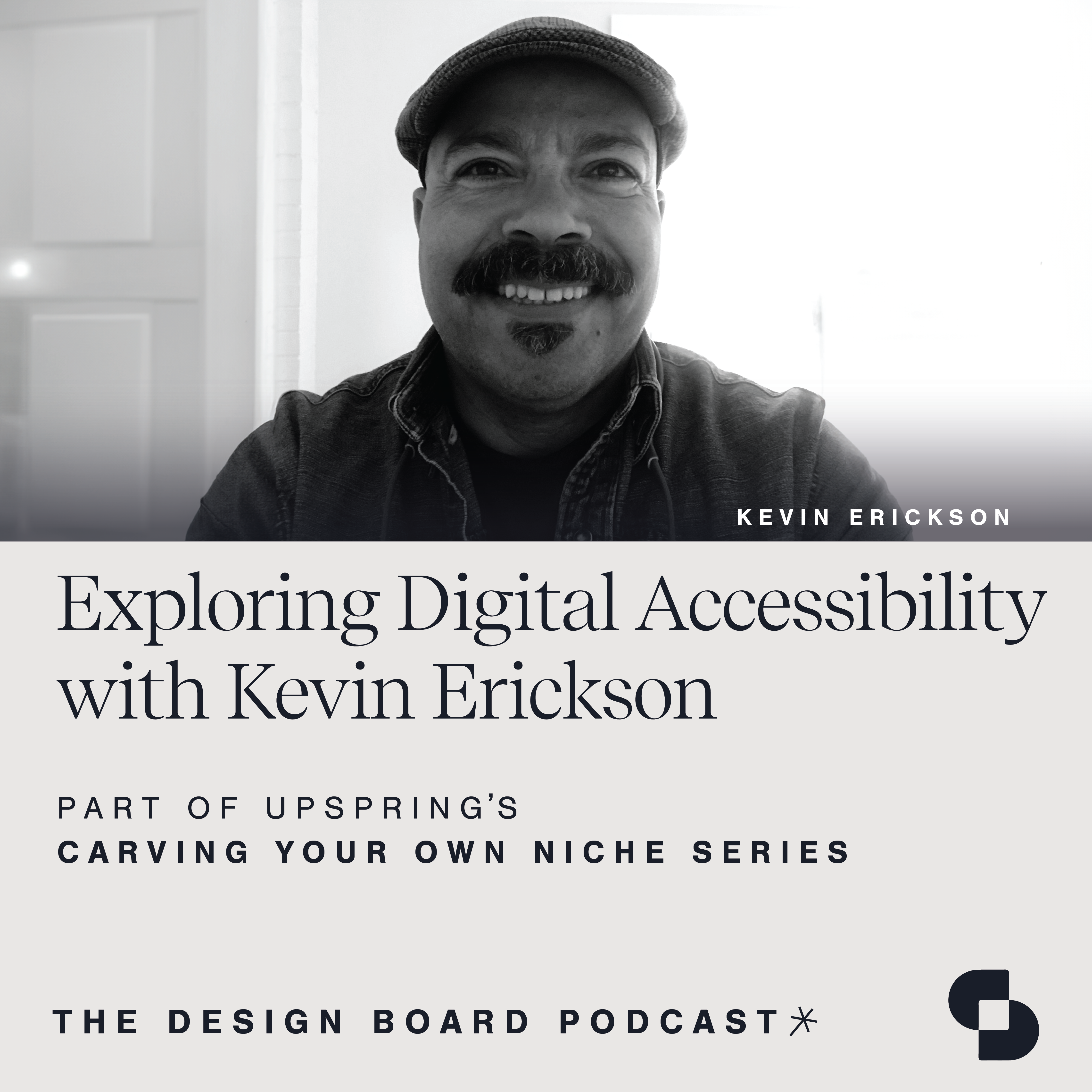On this week’s episode, host Tiffany Rafii sits down with co-hosts of Break Some Dishes, Jon Strassner and Verda Alexander, for a sneak peek into their upcoming season. Launching on March 20th, the podcast’s fifth season will navigate through topics like circular economy principles, biomimicry, and regenerative agriculture, offering listeners a glimpse into the transformative potential of creativity and innovation in addressing the world’s most pressing environmental challenges.
The Design Board, by UpSpring, is a proud member of SANDOW Design Group’s SURROUND Podcast Network, home to the architecture and design industry’s premier shows.
Speaker 1: Welcome to The Design Board, a podcast created by the team at UpSpring that focuses on design, development and everything in between. We invite innovators in our industry and explore topics that support your growth in every way. The Design Board is a proud member of SURROUND, a podcast network from Standout Design group featuring the architecture and design industry’s premier shows. Check it out at surroundpodcast.com.
Tiffany Rafii: Welcome everyone to The Design Board, a podcast by UpSpring that focuses on design, development and everything in between. I’m your host Tiffany Rafii, and today I’m joined by Jon Strassner and Verda Alexandra, co-hosts of Break Some Dishes, a podcast that takes a closer look at some of the environmental crises we face as a global community under the lens of creativity and design. The duo is gearing up for their fifth season, which launches on March 20th and can be found on the podcast network.
Today, we’re going to chat about everything from the power of positive design to the ways we can make a difference on our planet. We are also going to offer a sneak peek into upcoming episodes to come this season. Jon and Verda, thank you so much for joining me today. Really excited to have you.
All right, well, Jon, Verda, thank you so much for being here with us today. We’re excited to kick right in. So I’d love to start off by reflecting on your climate journey over the past four years. Jon, do you mind getting us started? How has your perspective on environmental issues evolved during this time?
Jon Strassner: Oh, Tiffany, thanks for having us on. First of all, it’s super fun to be here, and I’m the worst self reflector in the world. I feel like that’s not what I’m good at, but I have spent time self-reflecting on my journey the last few years since Verda and I have been podcasting. And I would say that my journey has really, to me anyway, how I define our climate crisis and how I define our action items, what we need to focus on has really gotten more complicated.
When Verda and I first started, we really were focused on the singular issues. We would spend a couple of episodes talking about ocean plastic, and then we would spend a couple of episodes talking about other singular issues. And I think that since 2020, right, Verda? 2020, when we started, I now look at the climate crisis in a much more holistic way. And I have recognized that it’s a very systemic crisis and it pops its head into so many different areas.
And so now working with Verda on this podcast, we’re dealing with social equity issues and we’re talking to people who are deep in the weeds of trying to save their own individual ecosystems, but we’re talking about so much more now than just a litter problem or a water pollution problem. We’re really talking to people about so many different issues now that impact climate crisis.
So I would say that my journey has made the conversation for me more complex and I think also more sophisticated. And I said this on an episode we just recorded a couple of weeks ago, that I’m so happy or I’m so grateful that I’ve embarked on this journey with Verda because had I just picked a friend of mine, just another white guy, we would’ve been looking at this crisis through the same lens. And Verda, being a female, looks at it through a slightly different lens than I do, and Verda doesn’t have any problem calling me out if I’m getting fixated down the wrong path. And I think that has opened my perspective a lot.
Tiffany Rafii: I love that. I think Verda, I’d love to hear your perspective on your journey too. I think from someone who’s clearly not nearly in the weeds the way you all are on dissecting this topic, I think I speak for a lot of people when I say that even those who really care about climate sometimes don’t even understand the layers and the depth. So I think having your perspective and having you go down that journey helps the rest of us who don’t know where to start. In our mind, it has been littering, right? That has been our contribution to really understand those layers opens our minds to possibility and understanding and being able to further the conversation and support in ways that we didn’t even know we were able to. So we’re obviously all grateful for that, but I think your own journey has found a level of sophistication and then of course given us that opportunity as well. So I think that’s really great and helpful. Verda, I’d love to hear your perspective too.
Verda Alexandra: Yeah, sure. Well, I started in workplace design over 30 years ago, but I came at it from fine arts, landscape architecture, and like Jon said, I am female, but I also was born in a different country. And so I came at this with a lot of different lenses, this whole problem of design. And for 30 years I thought I was doing really amazing things for the worker, bringing light into the workplace, creating more activity-based work, getting people to move around, making spaces healthier. But ultimately not too long back realizing that a lot of this really mostly benefited the corporation in terms of productivity of the worker, keeping the worker at the office and so forth. And so through that lens of outsider in and a creative viewpoint, I realized I needed to shift my focus. And the timing just coincided with this large awareness around the climate crisis.
And then just like Jon, my journey started with looking at the problem specifically like embodied carbon and how do we reduce that? How do we get more electric vehicles on the road? But then the more I dug in, I realized like Jon, that it’s a much bigger problem, that it’s an equity problem, that it’s a social problem, that it’s a systems problem in so many ways. Capitalism, colonialism, imperialism, patriarchy, they all contribute to this problem. And so when I say this is the issue, this is my number one focus, it’s because it’s all of it, everything combined.
Jon Strassner: It’s our next episode, Berta, all of it, everything combined.
Verda Alexandra: Oh yeah. Try to fit that one into 30 minutes.
Tiffany Rafii: Let’s shift gears a tiny bit and talk about activism in our industry. Jon, I’d love for you to chat us through the role you think activism plays in driving change within our industry, specifically in the design and A&D industry.
Jon Strassner: Activism is such, I think it’s so misunderstood in our country. It has a stigma attached to it. People think that activists need to be punished. I think that activists are looked at as these outlying individuals that are choosing not to conform or they’re looking for attention. Our industry, I’ll tell you, doesn’t have enough activists. We’re way too civilized, we’re way too polite. I think our industry is doing a lot right now to impact change, but you need activists who are going to be fearless in questioning establishment and questioning normal behavior, and probably fearless in ignoring social cues and deciding for themselves that they’re going to make change and they’re going to do it optimistically. And to me, activists really catalyze change because they start conversation. They force conversation sometimes where it’s really uncomfortable to have conversation. But at the same time, I look at activists that are also doing things. And so there’s that as well.
I think we need more active, we don’t have nearly enough activists. Just a shout out to Verda, because I was at an event with Verda once, and we were having this wonderful dinner with all of these designers and architects and everybody was talking and sharing their thoughts in a very predictable way, and nobody was upsetting anybody, but talking about what we thought the issues were, et cetera, et cetera, et cetera, et cetera. And Verda stood up and pulled the saber out of her belt and was like, “Enough with the bullshit. We have to change things. You can’t just keep going down this road.” And I think that that was a moment for me where I was like, Verda is an activist and we need more people that are willing to stand up and take a few arrows in the back to say what they think.
Tiffany Rafii: I love that. Verda, with those arrows in your back, I was really just going to ask your thoughts on really how creativity and design can be harnessed as tools for activism as well.
Verda Alexandra: Yeah. I think that when you put design and activism together, you have to first look at them separately. And activism is about wanting to make social change for the good. And design is a way I feel like anybody could be a designer. You don’t even necessarily have to be trained. Some of these people that we have interviewed this season, they’re not designers, but they’re doing design and design is everywhere, and everything is by design, like our monetary currency, our transportation systems, a subway system in New York City. The fact that there’s no subway system in Los Angeles, I could go on. But yeah, everything is by design. And so design is ultimately a political act. And I think that as designers, we need to recognize that everything we do, everything that we put out there is making a statement.
And what’s hard about design activism or engaging the power of creativity to enact design activism is that oftentimes as designers, especially in our industry, we’re working within a certain system which is client-based. And it’s a lot harder to do that. Design activism actually challenges power structures. That would be my definition. And that actually is a tool for social and environmental progress. And that is not an easy thing to build into your design process, whatever you’re putting together for your client.
And so I’m looking at, I have a project called Alternative Practice, and I think it might be some of these agencies, firms, small partnerships that are actually working outside of traditional systems that are tackling things in a bigger way. And part of that is by engaging the larger area of stakeholders, not just your client. It’s not just the site, but it’s the larger ecosystem. It’s those stakeholders that may have been marginalized or underserved for a long time that maybe don’t have a voice that need to be brought to the table. And I think it’s relearning the design process so we can be more inclusive, especially in those initial planning stages when we’re thinking about the design and who it impacts, what it impacts. And so it’s a larger conversation, but we need to start with realizing the power of design and the power that designers have.
Tiffany Rafii: Yeah, no, I think even beyond that, the acceptance for the fact that design has consequence regardless of whether or not you think it does, there’s a consequence, the design of everything. So that can either happen with intention or not, but it does, right? There is a consequence. So there’s a huge opportunity that comes with that as well.
Verda Alexandra: Yeah, often our intention is just fulfilling the design program and satisfying the client. So I think that’s where we need to chip away is how can we have much more intention and understand that impact.
Jon Strassner: I think one of our first episodes, and Verda, you probably remember when we were talking with one of the founders of Barreo, he said, “It’s a design problem, and the only way we’re going to fix it is to design our way out of it.” And I think that today, one of the things that we do at every episode is we go through this episode, we talk about this individual and what they’re doing, and then we really try to turn it toward design. How is this a design problem? How can this be a design solution?
Tiffany Rafii: So I’d love to chat a little bit more about what’s upcoming for Break Some Dishes, but before we do, I would love for you guys to walk me through how you came up with the name, because it is so cathartic. Who doesn’t want to break some dishes? I love it. How did that happen?
Verda Alexandra: Jon’s actually the namer of things. So Jon, do you want to take that one or I’m happy to.
Tiffany Rafii: I love it.
Jon Strassner: Well, yeah, it’s always been a saying that I’ve known that if you want to get something done, sometimes you’ve got to go in the kitchen, just start breaking some dishes. And so when Verda and I first started talking about doing this podcast, that was my thought was let’s call it Break Some Dishes, because that’s what we want. We want to break things down. We want to do it without fear of repercussion or fear of hypocrisy. We wanted people to know that they have a voice and they can share and express that voice, and we’re not going to call them out. There is no right or wrong. And so we’re just breaking dishes.
And I’ll tell you a funny story around that. A couple of years ago, Verda and I had… I’m going to tell the breaking dish story, Verda.
Verda Alexandra: Okay.
Jon Strassner: We have it all wonderfully captured on video, but we flew down to Dallas to do a photo shoot when we were with the Imagine A Place production team. And we went to this place, it was a beautiful showroom, and they had all these plates all over the place, and they thought it might be a really good idea if for part of the photo shoot, Verda and I had these plates and we were just going to break these plates and they could film it and take pictures of it and somehow incorporate it into the marketing.
And so I was like, “I know how to juggle plates. Why don’t I juggle these plates?” And they went, “Oh, yeah, that’s a great idea. You can juggle the plates and Verda can be there with a plate.” And so I started to do it and I broke a plate and cut myself.
And long story short, I had to go to the emergency room. I had to go to the emergency room in Dallas to get my hand stitched up.
Tiffany Rafii: Oh, no.
Jon Strassner: This was right at the height of COVID. I ended up catching COVID at the emergency room.
Tiffany Rafii: Oh, no.
Jon Strassner: And on my flight home, I had planned to spend a couple of days with my dad in North Carolina. And I realized that when I was at his house in North Carolina that I had COVID. And so I ended up quarantined at my dad’s house for two weeks, and then of course he got it. So I had to stay down there for another two weeks to help him out. And the funniest thing about this whole story is that when the PA was stitching up my hand, he was like, “So what brings you to Dallas?” And I basically said, “Well, I have a podcast, and we came down here to take some photos for some marketing.” “Oh, cool. Well, how did you cut yourself?” I said, “Well, I was messing around with these dishes and I broke one and cut my hand.” He was like, “No way. Well, what’s the name of your podcast?” I’m like, “Put the needle down and I’ll tell you.”
Tiffany Rafii: All right.
Verda Alexandra: And long story short, don’t juggle broken dishes.
Tiffany Rafii: Got it.
Jon Strassner: Don’t juggle dishes.
Verda Alexandra: I summarized that in three words, Jon.
Jon Strassner: Yeah, Verda, you’re much more succinct.
Verda Alexandra: And also, we started this in the pandemic, and we just realized there was a sense of complacency or just status quo in our industry, and we wanted to break things up. And we thought by bringing outside voices to the industry that people that were really shaking things up in pretty incredible and dramatic ways would be a way to jolt people out of that.
Tiffany Rafii: I love it. It’s your pandemic baby.
Verda Alexandra: Yeah. Pandemic podcast baby, along with 10,000 other podcasts.
Jon Strassner: Right. A pandemic podcast toddler now.
Tiffany Rafii: And a lot of real babies too. All right. Well, looking forward to the upcoming season of Break Some Dishes, what can we expect? Jon, Verda, what topics are you guys going to be covering and what themes can we look forward to?
Verda Alexandra: Yeah, we are actually starting season five, which is unbelievable. I can’t remember how many episodes we’re at, but we’re definitely over 50, 60?
Jon Strassner: Well over 50. Well over 50.
Verda Alexandra: Yeah, well over 50 episodes. Our first season we specifically looked at scientists, educators, product designers, activists, people in the nonprofit world, anybody outside of our industry. Our second season, we started to look at people more within our industry that were doing things differently. This season, we took on this title Rebels, Crusaders, and Outlaws almost very literally. We really wanted to go to places totally off the beaten track way out in the frontier where people were doing really wild things to mostly improve their own ecosystems through activism, through really doing some hard work within their own community or environment. And it’s been a pretty incredible ride so far. We’re about halfway through recording our episodes.
Tiffany Rafii: This sounds incredible. Can’t wait.
Jon Strassner: I think it has a surprise element that our previous seasons didn’t have. You could tell by the title we were going to be talking to a biologist about bio-material, or we were going to be talking to somebody about allergy materials. But now what we’re really talking to are people that are not experts in climate. They never professed to be experts, they never intended to have impact, and they were brought into it accidentally through a series of events and found themselves in a position to do something and did it. And so there’s that everyday Joe persona that we’re finding, but they’re doing something extraordinary that we think and hope can inspire other people in our industry.
Tiffany Rafii: Well, it sounds like there’s some amazing conversations to come and people to meet and interview, but so this question might change if I ask you again six months from now, but from where you are today, are there any interviews or topics that have left a lasting impression on you?
Verda Alexandra: Yeah, so many great ones. And I think more of these recent ones, there’s one or two from this season, but I’d like to not give up too much. I don’t want to tease out too much of these episodes, so I’ll go way back. I think it was episode nine. It was the owner of a lighting company called Stick Bulb. His name is Russell Greenberg, very smart guy, a philosophical sense to him. And the title of the episode is The Aesthetics of Ethics. And it’s something that I am still grappling with even right now because I think one of the challenges and one of the issues with our industry becoming even just more sustainable, let’s not even go even beyond that, is that the aesthetics, the trends are very much not focused on that. And that’s not built into how we see what is beautiful, what we see is a good project or a beautiful project or a well executed project. And I think that thinking about the aesthetics of sustainability or just even making an impact with your design and how that might be elevated and be something that we strive for versus just a trendy picture or an Instagrammable moment or those types of things.
So it’s been just that one comment from him. And then that title of that episode just has sat with me throughout these five seasons. And we even talk about it in season five.
Tiffany Rafii: That’s incredible.
Jon Strassner: Yeah. That’s funny because Verda, that’s probably before you started, that was…
Verda Alexandra: I’m glad I started first then because I would’ve had to come up with something else.
Jon Strassner: I know. Now I got to pull out something else out of my bag here. The other thing I liked about that episode is Russell also said that too often we wait until we know we’re right before we raise our voice. And if you wait until you know you’re right, you’ll never step up and say anything. And that stuck with me because after hearing that, I was like, that’s right. I’m not going to wait until I know anymore. If something’s on my mind, I’m going to feel like I can talk about it. Russell was very inspiring in that episode. I think it’s wonderful that he stays with us today. I think that’s the beauty of podcasting is to have these conversations with people and you just internalize them and you remember them.
I would say that moving away from Russell, probably my next favorite would probably be our interview with Porter Fox, who is this really amazing author. He writes about the climate change through the eyes of an adventurer skier. And basically his story is that when he was younger, he wanted to be a ski bum. He went to NYU and got a master’s of fine arts, and he wanted to write articles for Ski Magazine, and he kept sending them ideas and they kept sending him back, decline, decline. No, thank you. No, thank you.
And then finally he came up with this idea to write an article for them or a series for them where he would ski in the most outrageous, unpredictable areas and then write about it. And to his amazement, they came back and said, “Hey, we like that idea. We’re going to send you a photographer and a guide and you get to spend the next year skiing in the most weird locations and writing about it.”
And so he started to do that, and as he was doing that, he realized that the ski season was getting shorter, and the glaciers that he was skiing on, they were disappearing and the snow was disappearing. And so then he started to wonder what the hell is going on to this ski season and to these mountains? And so then he started to write more about the climate change, and he started to ski with people who were more involved in the climate change.
And so now he’s become this author that writes these beautiful books where he will tell you about this experience of skiing in Antarctica, but he’ll do it in a way that he educates you on what climate crisis that part of the globe is going through. And so I really loved talking with him. He was also very inspiring.
Verda Alexandra: I love that. I think going back to Russell’s comment, which has now stayed with me since you mentioned it a few minutes ago, if you wait to speak up, then you never will. What I love even more about that is if you turn it around and instead it’s less about you speaking up and maybe a little bit more about always making sure people around you feel like they have a safe space to speak up. I think oftentimes what’s hard for me even, not to make it personal, is you’re more likely to speak up in spaces where people create an energy, an accepting energy and taking responsibility for creating that space for people is almost, to me, more important than the actual act of speaking up because you want to encourage other people to speak up. It’s less about your noise, but rather creating an opportunity for other people to share their perspective. So I really love that in more ways than one.
Jon Strassner: Yeah. And I think with this conversation around climate, I think everybody worries that they’re going to sound like a hypocrite. They worry that, well, I’m not a great recycler, so I guess I shouldn’t talk about how we shouldn’t throw things away. Or geez, I’m not really donating money to WWF, so I guess I shouldn’t really talk about climate. And so my point very often is, it’s okay to be a hypocrite because nobody’s perfect in this conversation, so don’t think you have to be.
Verda Alexandra: Or in any conversation for that matter.
Tiffany Rafii: So there’s obviously so much to take away from these conversations that you’re having. As hosts of Break Some Dishes, what is your hope? What do you hope listeners will take away from these discussions that you’re having?
Verda Alexandra: Yeah, my personal hope in general, and actually the whole reason I’ve shifted my career is that I really do want to see change happen in the design and construction world. There’s a lot, it’s a large chunk of the CO2 emission pie, and it’s a place to start. It’s not the only thing that needs to happen in the world, but it’s a huge contributor to the problem, and we need to change our ways. And so that’s number one. And then I think on a personal or individual level, I’d like to see people inspired by these activists so much that they will think about what they can take on and what they can do.
Jon Strassner: I agree. I have probably the same aspirations of the podcast, but I will say that in the beginning, it was scary to be out there talking, sharing thoughts with people, and you didn’t know who was going to be listening. And then I was like, I hope a lot of people listen. And now I don’t really care so much how many people listen anymore. For me, the opportunity to find these people that are doing things that are extraordinary has been really personally very fulfilling. And it’s helped me to evolve as a person in this conversation. My perspective has broadened, my voice has gotten a little bit more experienced with it, and so I’ve grown a lot with it, which probably wasn’t my original intention.
Tiffany Rafii: So we always like to round these out, our Design Board podcast with some advice. So I would love it if the two of you would share some advice you would give someone who wants to make a difference but maybe doesn’t know where to start or how an individual can harness their own skills and passions to contribute meaningfully in the fight against climate change. Any thoughts there?
Verda Alexandra: Yeah, lots. I can give my big picture overview of making a difference, and it’s a spectrum. There’s individual action up to systems change. And individual action could be riding your bike to work or making sure you recycle or don’t buy shampoo bottles, things like that. It makes a small difference. It’s important, and especially if you start talking about it with other people, just starting to normalize, socialize things that need to happen, but that’s the base level.
Then you could get to bigger actions. You could start looking at what impacts you can make by say, not owning a car, things that are more challenging, maybe more difficult, impact your life a little bit more. And then you could look at how can you engage with other people, like a group, an organization, an association, an activist group, maybe protest, maybe write letters together. One of the number one things that would make an impact is getting involved in politics.
At a minimum, supporting candidates that have a green initiative, understanding what bills are being proposed, writing to your Congress people. Voting, of course. Things like that. But along the spectrum, it’s really important that you, A, what are you good at that you can contribute? And also, B, what are you passionate about that you can lean into? Those are two really important questions as I think you can make that much bigger of an impact if you put those two together with some action.
Jon Strassner: That was really good answer, Verda. Damn it.
Tiffany Rafii: Yeah, I was about to say, Jon, can you follow that? Anything to add?
Jon Strassner: Nothing substantial or valuable. But I will say that never has kept me from talking in the past. So to build on that, I will say this: eco guilt is a very real thing, and we all suffer from it. We recycle every day, and then we read an article that says we don’t recycle anything. And so-
Tiffany Rafii: What is that? By the way, what is that? If I see one more thing that says-
Jon Strassner: It’s my trigger.
Tiffany Rafii: Oh, you’ve been recycling your whole life, but actually only 0.001% of the things you recycled were actually recycled, I’m going to lose my absolute shit. Sorry, but are you kidding me? I’m over here rinsing things.
Jon Strassner: Yeah, yeah. Listen, I’ll tell you something else. We had a friend of mine on one of our earlier episodes who I love. His name is Aden Chandler. He is the senior VP of Sustainability for Aspen Ski Company, and he’s the one that introduced me to the concept of corporate complicity. And so the reason why I say that eco guilt is real, and we can’t beat ourselves up every day. Individual acts of consumerism will not be what saves the globe from this climate crisis. There has to be more. But it’s the individual acts of consumerism and everything that Verda said that it has to start there. And it’s really important that you as an individual can feel like you’re doing something.
The whole recycling thing is crazy because listen, plastic is petroleum based. And so what you’re going to see happen here, Verda knows that I’ve just been triggered. So listen, here’s what’s going to happen. Here’s what’s going to happen. Electric vehicles are going to take hold, and we’re going to start buying less fossil fuel from fossil fuel companies. We’re going to start buying less fuel because of electrical vehicles and electric bicycles.
And so these fossil fuel companies who decided years ago that they were going to be fossil fuel companies, not energy companies, these companies will continue to need their money. They’re controlled by very powerful people that don’t want to give up on power and money. And these companies will continue to sell their fossil fuels in the form of chemicals, petrochemicals, which go into plastics. And so you will see a surge in the coming years of our use and consumption of plastic because that’s what’s going to keep the fossil fuel industry alive.
On the back of all the plastic that we have, you see a symbol that’s got a one or a two or a three all the way up to a six, and it’s surrounded by the little triangle of arrows. That means it’s recyclable. It’s not recyclable because it has that label on it. The reality is that you can’t just take all the plastic out there and melt it together and mix it up and make stuff out of it because it won’t bond and it doesn’t work that way. And so if you want to recycle plastic, you have to be able to separate it. And so originally those symbols were put there to help recyclers separate plastic.
Verda Alexandra: They were actually created by corporations, and the symbol was meant to be vague or actually to look like a recycling symbol on purpose, even though only one, two, and six I think are recyclable. And that was done on purpose, again, by design.
Jon Strassner: Yeah, by design. Good, Verda.
Verda Alexandra: Sorry, Jon, didn’t mean to interrupt and trying-
Jon Strassner: No, no, no, no. No. No. Verda, you know you can interrupt me anytime. And Verda is absolutely right. I totally agree. So it was very vague, but it’s a very deceptive practice to make consumers feel as though plastic is okay, when in reality it’s not. And so it shouldn’t come as a surprise that we’re not recycling plastic because nobody wants all that other plastic. Nobody wants it. It has no value.
Verda Alexandra: Yeah. So corporations are feeding into this individual guilt through this idea of recycling. They really popularized this. Yeah, let’s get behind recycling, because then consumers are going to feel like they can just buy as many shampoo bottles as they want because it’s going to go into the blue bin and it’s going to get recycled. Same with the carbon footprint idea that was also popularized by, I think BP, by oil corporations. Let’s have individuals start measuring their carbon footprint, so their individual impacts, to take the attention away from who’s really polluting, which are the big corporations. Same with even electric vehicles. Let’s put all our hope in electric vehicles, even though there’s probably not enough minerals on the planet to basically create a fleet for the entire world of electric cars, and it isn’t going to actually solve our problems. So corporations are skewing the message to make us feel guiltier individually so that the blame gets diverted from them. Sorry, we’re getting way down a crazy path. We need to stop. We’re getting incensed.
Jon Strassner: Hey, let me tell you, man.
Tiffany Rafii: I really appreciate it. I’m thoroughly stressed out now, but I really, really, really appreciate it.
Jon Strassner: Welcome to our world, Tiffany. Welcome to our world.
Verda Alexandra: I think the thing to remember though is that we need to be like sleuths. We really need to uncover, not just accept what’s put in front of us. We really need to unearth research, understand what the real issues are and who are pulling the levers. Because again, it’s all by design and sometimes not by good design. And so I think if we can do that, if we can become more knowledgeable, educate ourselves, and that’s part of what we’re trying to do on these podcast episodes and understand where the problem really lies, we can make a bigger impact.
Tiffany Rafii: I love it. Well, you two are awesome.
Verda Alexandra: And we don’t have to go to bed feeling terrible about ourselves.
Jon Strassner: No, that’s just it.
Verda Alexandra: No, we shouldn’t do that.
Jon Strassner: Yeah. Listen, at the end of the day, Tiffany, our industry is an industry that is really caught up in selling more and making more and getting bigger. And I think that we’re going to have a hard time getting ourselves out of this problem until at the corporate level and maybe higher, we redefine what growth looks like because it used to be that you can’t expect infinite growth on a planet with finite resources. That’s bad math. And so companies need to say, what does growth look like? Because it probably isn’t going to be able to look like selling more furniture and widgets forever and ever and ever, because it just won’t. So what does growth look like? Can we decide that we want to be a more purposeful corporation? And then what does purpose look like? And I think that there are companies, Patagonia, that are starting to get their head wrapped around this and starting to understand what their responsibility is and what their accountability looks like to the planet.
Verda Alexandra: And if you think of Jon’s words, what does growth look like? So going back to this aesthetics, how can we come up with an embrace a new aesthetics that maybe is about reuse, sustainable, using less materials, using locally sourced things? So how can that aesthetic change so that all comes together? And we’re hopeful, I think, right, Jon?
Jon Strassner: Yeah, we really are. I think that we’re not all doom and gloom all the time. Just most of the time.
Tiffany Rafii: Well, thank you both so much for your time today. This was really fun. I know this is not about me, but it’s really fun for me. So thank you for taking the time to chat through this and everybody who’s listening I’m sure is beyond convinced that they should tune in to Break Some Dishes and we can’t wait to see what the upcoming season holds. So thank you again, and we can’t wait to follow along.
Jon Strassner: Yeah, thanks for having us. Really good to be here.
Verda Alexandra: Yeah, thanks Tiffany.
Speaker 1: Thank you so much for listening in with us today. We hope you leave inspired by the ideas in today’s episode. For more follow UpSpring on LinkedIn and Instagram. And don’t forget to check out the amazing lineup of shows brought to you by the SURROUND podcast network at surroundpodcast.com.

